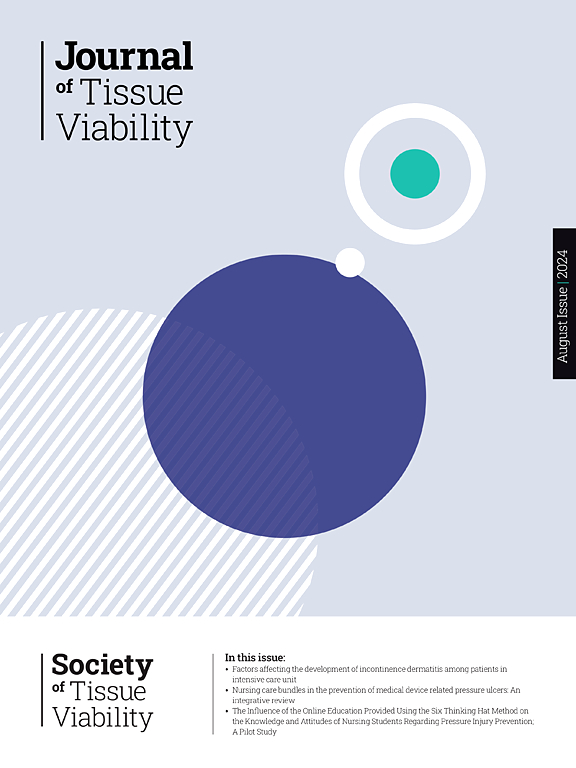绘制证据以确定压力、焦虑和抑郁对糖尿病相关足溃疡患者伤口愈合的影响:一项范围综述
IF 2.4
3区 医学
Q2 DERMATOLOGY
引用次数: 0
摘要
糖尿病相关性足部溃疡(DFUs)是糖尿病的一种严重并发症,全球约有6.3%的人受到影响,并显著增加了医疗负担。压力、焦虑和抑郁等心理因素在DFU患者中很常见,并被认为通过免疫系统破坏和自我保健能力下降影响伤口愈合。目的:本综述评估了目前关于心理困扰对DFU治疗影响的证据,确定了研究空白,并强调了在DFU治疗中整合心理健康支持的重要性。方法按照Joanna Briggs研究所的指南和PRISMA-ScR报告标准,在MEDLINE、CINAHL和PubMed进行全面的文献检索。研究纳入了报告压力、焦虑或抑郁的成人DFU患者和可测量的伤口结局。结果包括10项研究,一致表明心理困扰损害DFU的愈合。研究发现,慢性压力会延长炎症,削弱免疫功能,而焦虑和抑郁会导致自我护理能力下降,直接损害伤口愈合,进一步阻碍康复。这些发现强调了心理因素对DFU愈合过程的重要影响。结论应激、焦虑、抑郁等心理困扰可能影响糖尿病相关性足溃疡的愈合过程。然而,证据质量很低,因此很难得出明确的结论。这突出表明需要进一步进行高质量的研究,以阐明精神健康在DFU管理中的作用。本文章由计算机程序翻译,如有差异,请以英文原文为准。
Mapping the evidence to determine the influence of stress, anxiety, and depression on wound healing in patients with diabetes-related foot ulcers: A scoping review
Introduction
Diabetes-related foot ulcers (DFUs) are a severe complication of diabetes, affecting an estimated 6.3 % of individuals globally and significantly increasing healthcare burdens. Psychological factors such as stress, anxiety, and depression are common in DFU patients and are believed to impact wound healing through immune system disruptions and decreased self-care.
Objective
This scoping review evaluates current evidence on the influence of psychological distress on DFU healing, identifies research gaps, and underscores the importance of integrating mental health support in DFU management.
Methods
Following Joanna Briggs Institute guidelines and PRISMA-ScR reporting standards, a comprehensive literature search was conducted in MEDLINE, CINAHL, and PubMed. Studies with adult DFU patients reporting stress, anxiety, or depression and measurable wound outcomes were included.
Results
Ten studies were included, consistently demonstrating that psychological distress impairs DFU healing. Chronic stress was found to extend inflammation and weaken immune function, while anxiety and depression were associated with reduced self-care and directly impaired wound healing, further hindering recovery. These findings highlight the significant impact of psychological factors on the DFU healing process.
Conclusion
psychological distress, including stress, anxiety, and depression, may impair the healing process of diabetes-related foot ulcers (DFUs). However, the evidence is very low quality, making it difficult to draw definitive conclusions. This highlights the need for further high-quality research to clarify the role of mental health in DFU management.
求助全文
通过发布文献求助,成功后即可免费获取论文全文。
去求助
来源期刊

Journal of tissue viability
DERMATOLOGY-NURSING
CiteScore
3.80
自引率
16.00%
发文量
110
审稿时长
>12 weeks
期刊介绍:
The Journal of Tissue Viability is the official publication of the Tissue Viability Society and is a quarterly journal concerned with all aspects of the occurrence and treatment of wounds, ulcers and pressure sores including patient care, pain, nutrition, wound healing, research, prevention, mobility, social problems and management.
The Journal particularly encourages papers covering skin and skin wounds but will consider articles that discuss injury in any tissue. Articles that stress the multi-professional nature of tissue viability are especially welcome. We seek to encourage new authors as well as well-established contributors to the field - one aim of the journal is to enable all participants in tissue viability to share information with colleagues.
 求助内容:
求助内容: 应助结果提醒方式:
应助结果提醒方式:


